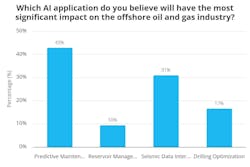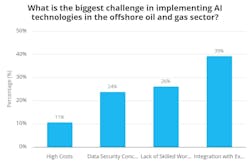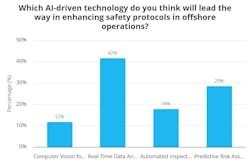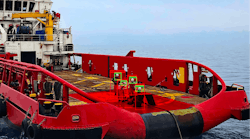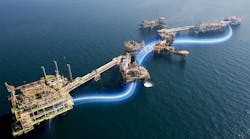Survey reveals biggest challenge in implementing AI technologies in offshore oil and gas sector
By Ariana Hurtado, Editor-in-Chief
Offshore recently surveyed its readers over a two-week period in May to discover the issues that are top of mind for offshore oil and gas company executives as they navigate the current artificial intelligence (AI) era.
The three-question survey included topics on predictive maintenance, data security, costs, real-time data analytics and more.
Respondents were with major oil and gas operating companies, consulting firms, service providers, EPC contractors, independent oil and gas companies, national/state oil companies, subcontractors, and marine support service providers, among others.
Of those that participated in the survey, most of them were in managerial roles: 20% described themselves as executive management (e.g., CEO, president, COO, owner, VP, managing director) and another 20% selected management (e.g., production manager, engineering manager, exploration manager). In addition, 17% selected consultant. The remaining participants ranged from smaller groups of, among others, technical executives (e.g., CTO, CIO, VP of technology, VP of digital), engineers, and geologists/geophysicists.
As Offshore is a global resource for the offshore energy industry, the survey participants were based all over the world. For instance, the regions with the most participation included 23% from the US (75% of those were from Texas and Louisiana), 14% from Brazil and 11% from India.
The survey results
The first survey question revolved around AI applications that were making the most significant impact on the offshore oil and gas industry. The majority of survey respondents (43%) selected predictive maintenance, with the second most popular answer choice being seismic data intepretation (31%).
| Predictive Maintenance | 42.86% |
| Reservoir Management | 9.52% |
| Seismic Data Interpretation | 30.95% |
| Drilling Optimization | 16.67% |
The next question focused on the issues being encountered when implementing AI technologies. The majority of survey participants (39%) selected integration with existing systems as the biggest challenge.
| High Costs | 10.71% |
| Data Security Concerns | 23.81% |
| Lack of Skilled Workforce | 26.19% |
| Integration with Existing Systems | 39.29% |
The third and final question of the survey was created to decipher which AI technologies are trending in the safety space. The majority of respondents (42%) chose real-time data analytics as the technology that will lead the way in enhancing safety protocols in offshore operations.
| Computer Vision for Equipment Monitoring | 11.9% |
| Real-Time Data Analytics | 41.67% |
| Automated Inspection Systems | 17.86% |
| Predictive Risk Assessment | 28.57% |
Want more AI content?
About the Author
Ariana Hurtado
Editor-in-Chief
With more than a decade of copy editing, project management and journalism experience, Ariana Hurtado is a seasoned managing editor born and raised in the energy capital of the world—Houston, Texas. She currently serves as editor-in-chief of Offshore, overseeing the editorial team, its content and the brand's growth from a digital perspective.
Utilizing her editorial expertise, she manages digital media for the Offshore team. She also helps create and oversee new special industry reports and revolutionizes existing supplements, while also contributing content to Offshore's magazine, newsletters and website as a copy editor and writer.
Prior to her current role, she served as Offshore's editor and director of special reports from April 2022 to December 2024. Before joining Offshore, she served as senior managing editor of publications with Hart Energy. Prior to her nearly nine years with Hart, she worked on the copy desk as a news editor at the Houston Chronicle.
She graduated magna cum laude with a bachelor's degree in journalism from the University of Houston.

